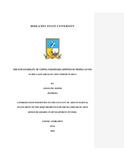Please use this identifier to cite or link to this item:
https://cris.library.msu.ac.zw//handle/11408/3374| Title: | The sustainability of coping strategies adopted by people living in dry land areas of Chivi north ward 4 | Authors: | Hofisi, Angeline | Keywords: | Drought Dry land areas Vulnerability Sustainability Zimbabwe |
Issue Date: | 2016 | Publisher: | Midlands State University | Abstract: | Drought is the major climatic condition that has been faced by people in dry lands .The aim of the study was to find out what people in dry lands of Chivi do in response to recurrent droughts that they face day to day as well as to investigate into the sustainability of the coping strategies adopted. From the interviews, questionnaires and observations that were used in the acquisition of data, the study discovered that eradication of drought vulnerability in Chivi remain an elusive goal. Indicators of drought vulnerability include poor meals and the general reduction of the number of meals per day, doing odd jobs for staple food ,the general skeletal appearance of livestock, death of livestock, high prices of maize just to mention a few. Households have adopted different coping strategies which include income response strategies, consumption strategies, and strategies on livestock, migration, and relocation to newly settled farms among other things. All the strategies adopted in the households are aimed at ensuring food availability. The coping strategies adopted have contributed much to the survival of the people but have not been sustainable in bringing about long term benefits but rather they are just relief measures employed on permanent problems. The study unearthed that in dry lands of Chivi where crop cultivation has failed, livestock such as goats and cattle plays a very important role in their livelihood activities. In trying to cope people face a lot of constraints which hinders the coping capacity of households in ward 4. These constrains include lack of capitals, (social, political and financial capitals), weak capacity to diversify their livelihood strategies as well as lack of knowledge on what livelihood activities should be implemented in their area. | URI: | http://hdl.handle.net/11408/3374 |
| Appears in Collections: | Bachelor Of Arts In Development Studies Honours Degree |
Files in This Item:
| File | Description | Size | Format | |
|---|---|---|---|---|
| angie final draft.pdf | Full Text | 1.58 MB | Adobe PDF |  View/Open |
Page view(s)
162
checked on Jan 11, 2026
Download(s)
132
checked on Jan 11, 2026
Google ScholarTM
Check
Items in MSUIR are protected by copyright, with all rights reserved, unless otherwise indicated.



